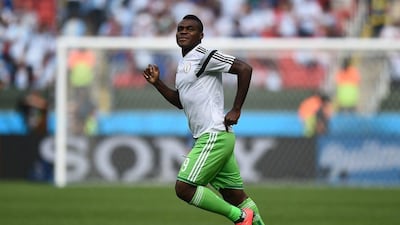Emmanuel Emenike travelled a long road to get to Brazil, at times even on foot, once stopping at a Turkish jail cell, but he made it to the World Cup.
It was a close-run thing and there were times when such a scenario seemed more than just unlikely. Yet, at 27 years of age, Emenike will lead the line for Nigeria against France in the World Cup last 16 on Monday.
It was his goal against Malawi in a 2-1 World Cup qualification victory, following a brief international exile, that helped Nigeria through to the play-offs round in which they overcame Ethiopia.
Emenike had then done enough to earn not just a place in Sephen Keshi’s squad but also his starting XI.
Click here to visit The National’s World Cup 2014 landing page
A year ago that had seemed unlikely after Emenike, suffering from a groin problem that regularly kept him off the pitch, had rows with Keshi and the Nigerian Football Association.
Emenike publicly rebuked both for their lack of interest in his injury issues and was subsequently dropped from the team, missing the Confederations Cup.
That was an untimely blow, as it came so soon after his starring role at the 2013 Africa Cup of Nations, in which he finished joint top scorer with Ghana’s Wakaso Mubarak, as Nigeria won the title.
Out in the cold, that could have spelt the end of the line for Emenike at international level but Keshi needed him and a recall came for the crucial Malawi match. His goal helped change Nigeria’s destiny and ensured his own tortured path to the World Cup would at last end in joy.
The long road began at Delta Force in the town of Asaba in the Niger delta, where Emenike faced a 90-minute round trip on foot just to get to training and back.
Although if there was one positive omen, it was that he trained at the Jay Jay Okocha Stadium, named after one of the country’s greatest midfielders.
At 20, Emenike headed to South Africa and the professional game to try his luck, first with Mpumalanga Black Aces before moving on to play for Ajax Cape Town.
He caught the attention of European spies and a move to the Turkish outfit Karabukspor ensued.
There he notched 30 goals in 50 games and was a member of the team that won the second-division title in his first season.
But the controversies began when Emenike sued a Turkish tabloid newspaper, which had accused him of being older than was claimed.
Fenerbahce, the big Istanbul side, came calling but that dream move soon turned sour as Emenike was embroiled in a match-rigging scandal that saw his club banned from European football for a year.
Emenike was accused of involvement in the match-fixing and spent a night at a police station for questioning over the affair.
Fenerbahce found a quick-fix solution to the problem and sold the Nigerian to Spartak Moscow, in Russia, before he had played a match in their colours.
Emenike was the victim of racist abuse in Russia and served a ban for responding to his tormentors, Dinamo Moscow fans, with an ill-advised hand gesture.
Two years after he had arrived in Moscow he was acquitted back in Turkey of any wrongdoing because of a lack of evidence. He made a triumphant return to Fenerbahce, who won the Turkish Super Lig in his first season with them.
Now, not only is he back and playing in a World Cup knockout round match today, but there are rumours Chelsea’s manager Jose Mourinho is an admirer and is lining up a bid for his services next season.
It has been a long road for Emenike but he may be thinking it has been worth it.
Follow us on Twitter @SprtNationalUAE

